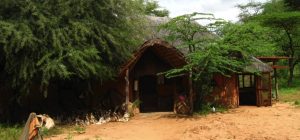
The Samburu research camp is not the regular kind of research ground you come across. With respect to efficiency and competence, the area carefully blends the four fundamental Rs of Research, Recreation, Restoration and Responsibility.
The camp has a tone of educative research activities going on; from mammal census, immobilization activities (e.g. collaring) to long term monitoring of elephants within the reserve. Take a stroll to the camp’s main office and you’ll be sure to find countless insightful files and folders of past and ongoing research activities.
Like I mentioned in my previous blog, I had the opportunity to go for a mammal census in one of the five routes. It didn’t feel like work, it felt like a two-hour recreational game drive. What more? The countless number of birds, small rodents and cheeky primates will guarantee you a free game-watch by the lunch table. Oh and let’s not forget the dedicated staff at camp. These people make a great company and are only too willing to help when the need arise.
When it comes to restoration, STE together with its able research team and community members have been effective at conducting restoration programs within and around the reserve. The camp has collared a number of elephants, rescued the orphaned animals and kept track of their numbers through constant monitoring and evaluation.
The research camp has also strived to integrate the community in its various programs. Most informants (including reformed poachers), camp staff and research assistants are from the community neighboring the camp. It also strives to educate bright needy students who are enrolled in a scholarship program throughout high school. The community has benefited largely from multiple projects put up by STE. Oh and lest I forget, did I mention that STE has a whole new program dedicated to community mobile education? Talk of corporate social responsibility, Save The Elephants got it just right!

